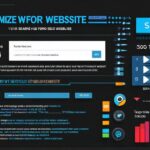Table of Contents
- Introduction
- Keyword Research
- On-Page Optimization
- Off-Page Optimization
- Content Marketing
- Technical SEO
- Analytics and Reporting
- Summary
- FAQs
Introduction
Search engines have evolved significantly over the years. They are no longer just looking at keywords but also take into account user behavior, website structure, and content quality. In this guide, we will provide you with a comprehensive overview of how to optimize your company website for search engines (SEO). By following these tips, you can increase your website’s visibility, attract more traffic, and ultimately generate more leads and sales.
Keyword Research
Keyword research is the process of identifying relevant keywords and phrases that people use when searching for products or services like yours. The goal of keyword research is to find out what your target audience is looking for and how they are searching for it. Here are some tips to help you conduct effective keyword research:
- Use keyword research tools such as Google Keyword Planner, SEMrush, Ahrefs, and Ubersuggest. These tools can help you identify high-volume, low-competition keywords that are relevant to your business.
- Look at your competitors’ keywords. You can use tools like SEMrush or Ahrefs to see which keywords your competitors are targeting. This information can help you identify gaps in the market and opportunities to rank higher in search results.
- Use long-tail keywords. Long-tail keywords are longer, more specific phrases that people use when searching for products or services. These keywords tend to have lower competition and higher conversion rates.
- Conduct a keyword audit. A keyword audit involves analyzing your website’s current keyword rankings and identifying opportunities to improve them. You can use tools like SEMrush or Ahrefs to conduct a keyword audit.
On-Page Optimization
On-page optimization refers to the techniques you can use to optimize individual web pages on your website for search engines. Here are some tips to help you optimize your website’s pages:
- Use relevant keywords in your title tags, meta descriptions, and header tags. Your title tag should be no more than 60 characters long and include your primary keyword. Your meta description should be no more than 155 characters long and include your primary keyword. Header tags (H1, H2, H3) should also include your primary keyword.
- Optimize your images. Use descriptive file names for your images and include relevant keywords in the alt text. This will help search engines understand what your images are about and improve your website’s visibility in image search results.
- Use internal linking. Internal linking involves linking to other pages on your website. This can help search engines understand the structure of your website and improve your website’s relevance for specific keywords.
- Optimize your content. Make sure your content is relevant, informative, and engaging. Use subheadings, bullet points, and visual elements like images and videos to break up your content and make it more readable.

Off-Page Optimization
Off-page optimization refers to the techniques you can use to improve your website’s visibility in search results by building high-quality backlinks from other websites. Here are some tips to help you optimize your off-page efforts:
- Build quality backlinks. Quality backlinks come from reputable, authoritative websites that are relevant to your business. You can build quality backlinks by guest posting on other websites, collaborating with influencers and bloggers, and creating shareable content.
- Avoid low-quality backlinks. Low-quality


